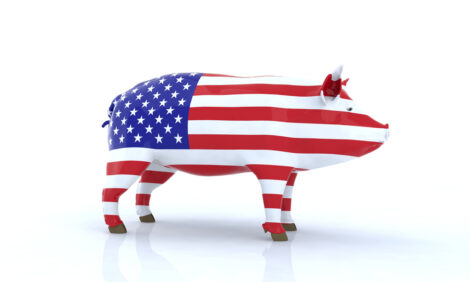



Blue-Ear Pig Disease Strikes in Thailand Again
THAILAND - Pig producers expect the present high pork prices to come down over the next six months as new pigs entering the market make up for the present shortfall being blamed on a virus.They said porcine reproductive and respiratory syndrome (PRRS), also known as blue-ear pig disease, has reduced output, pushing retail pork prices to a record high of 160 baht a kilogramme from an average of 90-100 baht last year.
The PRRS virus causes reproductive failure in breeding stock and respiratory tract illness in young pigs. It has hit Asia including Thailand hard since last year.
Swine output in Thailand is expected to fall by 30 per cent this year from a previously estimated 12 million animals.
Surachai Sutthitham, president of the Swine Raisers Association of Thailand, said the local industry had also been affected by other ailments including porcine epidemic diarrhoea and foot-and-mouth disease.
As well, the hotter weather alone has shaved 14.5 per cent off average daily production of 38,000 animals, he said.
Mr Surachai and major raisers' associations from several provinces yesterday said the high pork prices were also due to rising production costs.
According to Bangkok Post, the cost of feed meal ingredients has increased by an average of 20 per cent, especially prices of broken rice, rice bran and soybean meal, pushing up feed to 75-80 baht/kg from 60 baht in past years.
The higher costs make the Internal Trade Department's suggested farm-gate price of 79-85 baht/kg for live pigs and retail price of 140-150 baht impractical, said Mr Surachai.
The associations said disease has lifted the prices of live pigs throughout Asia. In China, they are going for the equivalent of 102 baht/kg from 100 baht last week, while in Taiwan the price is 118 baht from 112 baht.
Farm-gate prices in Thailand are much cheaper compared with those countries or even Cambodia and Laos, where live pigs are priced at 92-94 and 88-92 baht/kg, respectively.
However, raisers note that not all cuts of pork are sold at high prices. Tenderloin and sirloin fetch up to 160 baht/kg, but other cuts cost less.
Mr Surachai said Thai farmers' timely containment of PRRSV has helped mitigate the effects of the virus, and he expects full operations to resume soon.
He believes pork prices will come down over the next six months.
It takes 5-6 months to raise a commercially viable hog weighing 90-100 kg. A hog is any pig weighing more than 54 kg.
Associations representing provinces in the Central region, which control 70 per cent of pig production, suggest the government rely on market mechanisms rather than price-control measures.
Currently, about two-thirds of Thailand's 200,000 pig farmers are small operators with only limited capability to deal with new threats such as disease and climate change.
To keep prices down, the Internal Trade Department will work to ensure a sufficient domestic supply of live swine.
Exporters will need to obtain permission to ship their goods, while raisers will have to report their capacity and production figures.
Permission will be required for exports of both pigs and pork. Earlier, the department controlled only pig shipments.
Further Reading
| |
- | Find out more information on PRRS by clicking here. |







